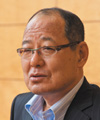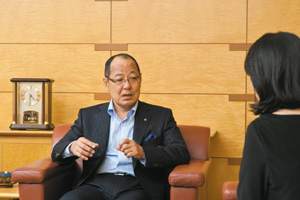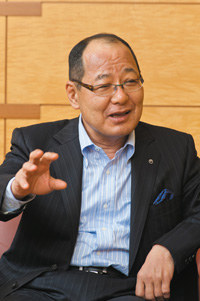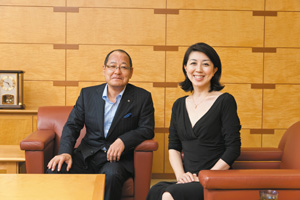 |
|
|
|
|
|
View from the Top Vol. 10, No. 10, pp. 1–4, Oct. 2012. https://doi.org/10.53829/ntr201210tp1  Toward a Company that Inherits Workplace Skills and Connects the Community through CommunicationsOverviewThe information and communications technology market is undergoing dramatic changes as smartphones and tablet computers become increasingly popular throughout society. The seamless convergence of wired and wireless communications is accelerating and even the management environment is changing by necessity. How is NTT EAST set up to face this changing world? We asked Masayuki Yamamura, who took up his new position as President of NTT EAST in June 2012, about his tactics, including his management philosophy and his approach to inspiring employees. Facing a dramatically changing market from the customer’s viewpoint—Congratulations on your appointment to president. Looking again with a fresh eye, how do you view the management environment at NTT EAST? Well, since I had already been working at NTT EAST before taking up this position, it’s a bit difficult to look at things with a fresh eye. I think it’s best if I continue to assess the situation as I’ve been doing up to now. That being said, my impression is that the management environment is changing at an accelerating pace. NTT EAST is in the business of fixed-line communications, and up until recently, our competitors were other fixed-line operators and cable television companies because mobile communications was essentially segregated from this business. Today, however, we have smartphones and tablets, and it has become commonplace to make high-speed Internet connections from mobile terminals. From the customer’s viewpoint, it’s the service that counts and not the facilities providing it, so we have entered into a competitive relationship with mobile communications too. In short, the competition is becoming increasingly diversified. At the same time, smartphones and tablets are penetrating society at an unprecedented speed, and it is difficult to foresee the trend from here on. The possibility that customers might abandon NTT EAST in droves cannot be denied. In this sense, the NTT EAST business environment is at an inflection point from which the future is hard to discern. This kind of change has occurred in the past, but today we are facing severe conditions—we must quicken the pace of our response with a sense of vigilance. —Please tell us how NTT EAST intends to deal with this situation. If we were to accommodate smartphones and tablets, I think that it would be to meet the diversified needs of our users. However, we must still respond to the diverse usage formats and needs of our customers with respect to fixed-line communications. Users of optical services include single persons and family members plus homeowners and renters. They also include people who work at home and people who work at a company office or elsewhere. Meanwhile, in the case of family members, some may use optical services during the day and others during the evening. The usage format may also vary: optical services may be used to collect information, communicate with others, shop online, watch videos, or listen to music. To respond effectively to such user diversity, we must formulate measures for getting our customers to use our services over the long term and we must take up the challenge of expanding our business area to satisfy new needs. Specifically, there are three measures that we must take, which I’ve talked about at various places since becoming president. The first is to promote the use of optical services. Thanks to the efforts of NTT EAST employees, achieving 10 million subscribers for FLET’S HIKARI services is now within our reach. Up to now, however, we have been concentrating our energies on adding more subscribers by, for example, expanding the service area. But from here on, I would like to put more effort into achieving long-term use of our services. To this end, we have launched a new rate plan called Ninen-Wari that provides a monthly discount to users who subscribe to a two-year plan and we have also introduced a points service. We have also diversified the fee menu taking into account light users of services. Additionally, we now provide convenient services such as FLET’S Miruene that provides users with a means of visualizing the amount of energy used in a home. And on top of this, we have decided to promote the expansion of Wi-Fi environments through joint projects with local entities, such as the Yamanashi Free Wi-Fi Project that aims to install Wi-Fi spots at about a thousand locations within Yamanashi prefecture and the Jiyugaoka HIKARI Wi-Fi City Project in collaboration with the Jiyugaoka Shopping Arcade in Tokyo. I would like to expand these kinds of activities while listening closely to the opinions of each and every customer. The second measure is to develop new sources of revenue. To this end, we are considering new network-based services that we would like our customers to use. For example, we could provide a service for managing a customer’s facilities over the network or a service that would absolutely prevent the deletion of critical data in residents’ files held by local governments by storing backup information at remote locations. Services like these can be provided in a cloud-based format thereby lowering initial costs and providing a user-friendly environment for customers. And to further diversify our business, I would like to expand our offering of services for solving regional problems associated with disaster preparedness, the aging society, and other issues, that is, services that provide true benefits for our customers. Finally, the third measure is to improve productivity in the work that we do. There are various things that we need to do in this regard such as reducing costs and shortening working hours. In this way, I aim to achieve a turnaround in business results from ongoing drops in revenue to ongoing increases in revenues and profits while providing our customers with solutions to specific problems and opening up new sources of revenue. Of course, these cannot be achieved unless all NTT EAST employees work together as one. My role is to talk frequently with the people who are implementing these measures to make sure that they are all moving together with a common sense of purpose. Since becoming president, I have been making the rounds of the branch offices and also talking with many employees in the head office.
Taking on challenges and using numerical results to get answers—What kind of matters do you talk about in particular? The topics differ from place to place, but what I tell everyone is that it is important that they try something, that they adopt the attitude of enjoying a challenge! No results will be forthcoming if nothing is attempted, so it is OK to fail. However, if a mistake is made, it is important to stop, make a course correction, and try something else. People tend to think that their measure or policy is correct, that a lack of results is due to the current business environment, and that a little perseverance can eventually produce results. Numbers, however, are always honest, so a new course of action should be checked using figures. When implementing a particular measure, it should be possible to see some results in the figures in about half a year’s time, so if such figures are practically unchanged after half a year, the measure should be deemed ineffective and gracefully withdrawn. In the past, the period for assessing the effectiveness of a measure was one year, but for present day needs, three months might be more appropriate. —Isn’t a three-month cycle quite a challenge? I think it’s essential to experiment with a variety of measures and absorb those that produce results if we are to respond to the diverse usage formats and needs of our customers. But to pursue such experimentation with sufficient speed, I think that a certain amount of delegation of responsibility is necessary. Trusting in the creative abilities of on-site personnel and transferring authority are important elements of this process as long as all efforts fit within an overall framework. However, if we place too much emphasis on words like speed and three-month cycle, we run the risk of developing a bias toward short-term matters and immediate profits. For this reason, we must undertake our projects with a sense of urgency while keeping a medium-term outlook and keeping things in perspective. Conversation is also a key element in maintaining such a balance.
Management that appreciates employees’ efforts—What else do you hold important in your work? Well, speaking of challenges, I have always thought that, at least one a year, I should try to do something that no one has been able to do before. For example, while general manager of the Tokyo branch of NTT EAST, I was able to get that branch to adopt on-site recruiting that it was said could not be adopted, and I was able to establish an urban development sales department when it was said that the organization of the branch could not be expanded. Furthermore, when I was at NTT Holding Company, everyone was shocked at my proposal of listing NTT Urban Development Co. on the Tokyo Stock Exchange, but I was able to push that through. As challenging as these problems were, I was somehow able to obtain the understanding of my superiors and get my proposals accepted. On making the rounds of the branch offices, I sensed that a somewhat overly defensive approach was being taken. In the face of an increasing number of customers discontinuing their use of FLET’S HIKARI services, branches have had no recourse but to focus their efforts on measures that would in some way keep these customers. Nevertheless, I feel that a more aggressive stance should be adopted by making a simultaneous effort to explain the benefits of NTT EAST services and to persuade prospective customers to use those services. And there is one more thing. At a certain point in the past, it dawned on me that it was part of my job to recognize the difficulties that my subordinates went through as they accompanied and assisted me whenever I made an all-out effort to solve a problem at hand. I came to realize that, regardless of whether my superiors accepted a proposal on the basis of material painstakingly prepared by my subordinates, the process involved an exchange of ideas and opinions with those subordinates that was useful for the future. If my work style were to sing my own praises and just have the people around me prepare materials, I would only grow apart from them. Work should be an enjoyable endeavor, but if it involves only carrying out instructions, it can hardly be enjoyable and rewarding. An individual should be able to take some risk and accept responsibility for making judgments on his or her own and moving forward. I now see that results achieved together with my subordinates belong just as much to them as to me and that work can be even more enriching if credit is given where it is due. Likewise, despite the hardships brought on by the Great East Japan Earthquake, employees in the affected areas did an absolutely outstanding job. The Miyagi area was without domestic gas for about a month, during which time people could not eat warm food despite the cold weather. Nevertheless, NTT EAST employees in the region put all their effort into restoring the infrastructure even though some of them had their homes ruined or their parents evacuated from Fukushima to safety elsewhere. Despite these severe conditions, these employees came to work and restored networks damaged by the disaster. Just hearing about their efforts and commitment is enough to bring tears to my eyes. The business of NTT EAST is built on the support of employees like these, and I’ve been thinking for some time that I should manage in a way that acknowledges the great efforts made by our employees. Solving Japan’s problems through communications, in close cooperation with customers—Mr. Yamamura, what message do you have for NTT EAST employees? I am convinced that communications is one means of solving the diverse problems that currently surround Japan. Our intention at NTT EAST should be to solve each and every problem that is within our capabilities. Let’s confront these problems together with our customers and create things that bring them satisfaction. —Can the same be said for NTT researchers? If we are talking about basic research performed over five- or ten-year cycles, I look at it as research in the pursuit of truth, so I would like to see those researchers do just that without distraction. Basic research is, of course, necessary, and I believe that the technologies born from such research are absolutely critical during a time of great changes in society. On the other hand, in developing practical applications with the aim of putting a technology on the market in a year or two, it is important to create value that will appeal to customers. Regardless of how advanced such technology may be in the field in question, it will be of little value if it is not accepted by customers. Even a product or service with great performance will fall by the wayside in an era that simply has no need for that level of performance. In any case, I think that a mindset that aims to create something that will satisfy the needs of customers is essential even for researchers.
Interviewee profileCareer highlightsMasayuki Yamamura received the B.E. degree in physical electronics and the M.E. degree in electronic engineering from Tokyo Institute of Technology in 1976 and 1978, respectively. He joined Nippon Telegraph and Telephone Public Corporation (now NTT) in 1978. He became a Member of the Board of NTT EAST and General Manager at the Tokyo branch in 2005, Executive Director in 2008, and General Manager of the Network Promoting Department in 2009. He was appointed President of NTT EAST in June 2012. |
|











